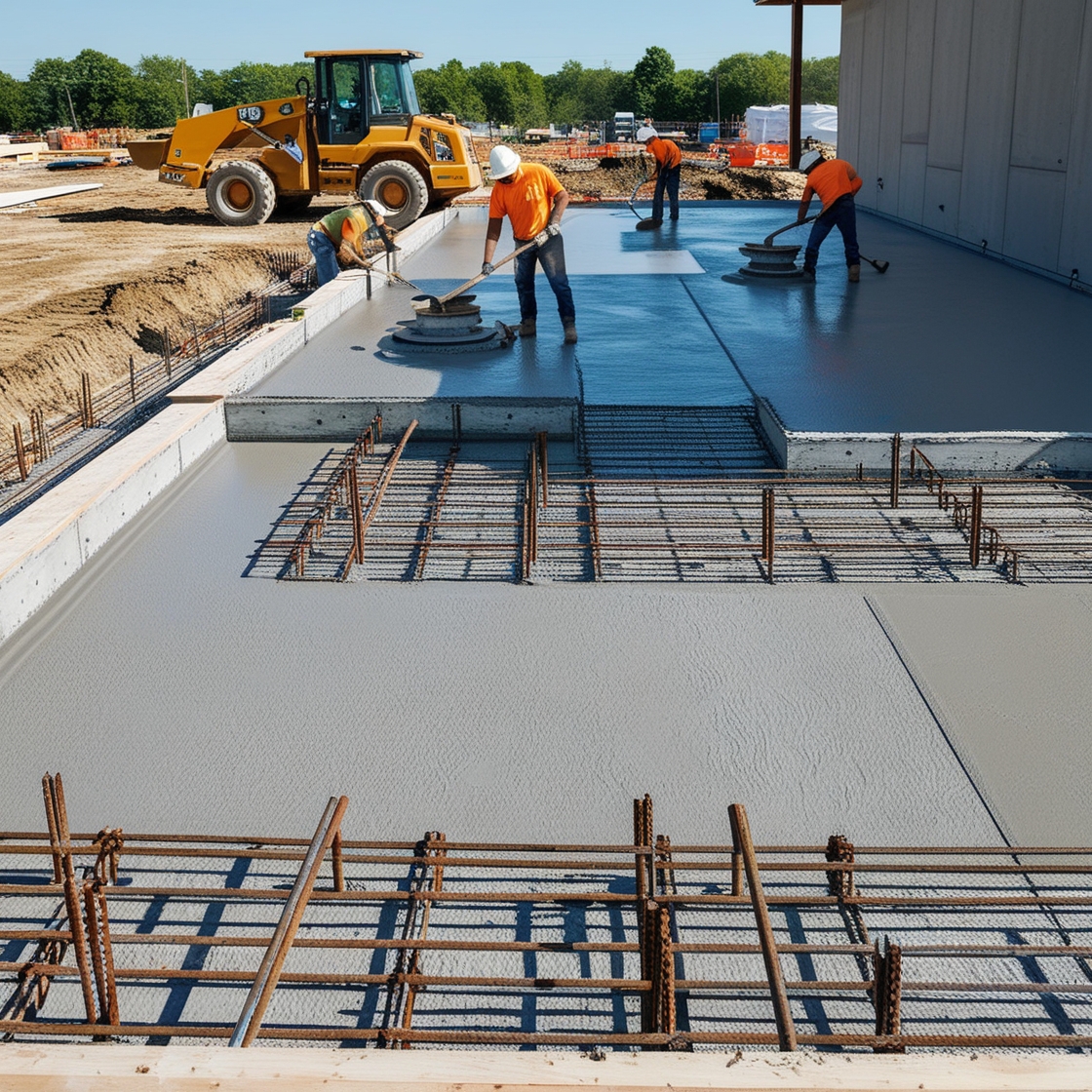Concrete pads play a vital role in building things like driveways, patios, and areas for heavy equipment. A concrete pad is a flat, solid surface made of concrete, which is a strong material used to support weight. One of the most important things to think about when creating a concrete pad is its thickness, which refers to how deep the concrete layer is. The thickness of the pad affects how much weight it can hold, how long it will last, and how well it resists cracking.
If the concrete pad is too thin, it may crack or wear out quickly, causing the structure to weaken. On the other hand, if the concrete pad is thick enough, it can handle heavy loads and last for many years. For example, a driveway that needs to support the weight of cars or trucks will need a thicker concrete pad than a simple walkway or patio that only holds people or furniture.
In this article, we will explore why concrete pads need to be thick, how the thickness affects their strength, and what factors you should consider when deciding how thick your concrete pad should be. Understanding this will help ensure that your concrete projects are strong and long-lasting.
What is Concrete Pad Thickness?
Concrete pad thickness refers to how deep the concrete layer is when you pour it to make a flat, sturdy surface. The thicker the concrete, the stronger and more durable it becomes. A thick concrete pad can support heavier weights without breaking or bending. If the concrete pad is too thin, it may not hold up under pressure, causing it to crack or wear down faster.
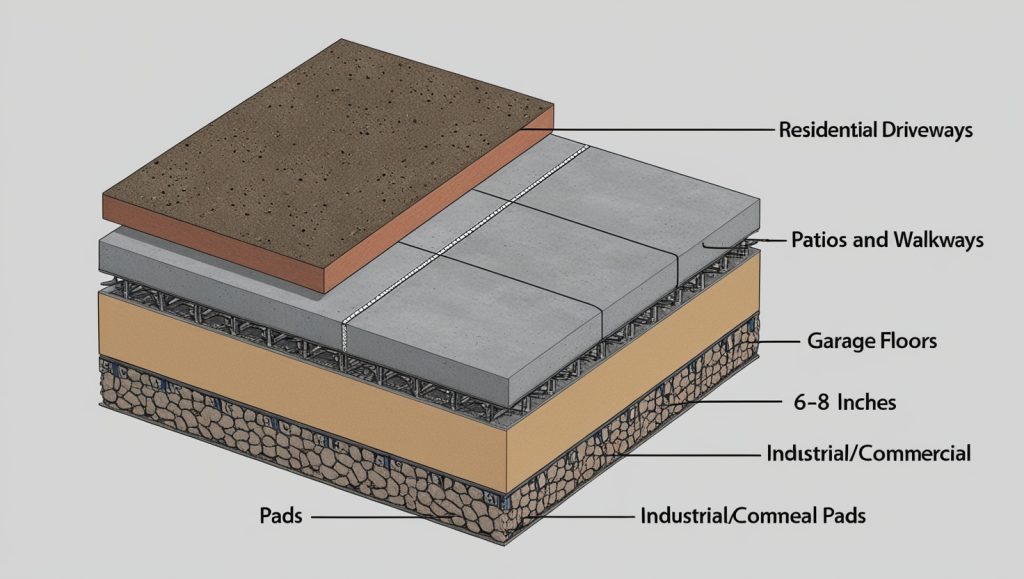
To make sure your concrete pad lasts a long time and remains strong, you need to make it thick enough to support whatever is placed on it. Whether you’re building a small patio or a large driveway, the right thickness is key to creating a stable and reliable surface that will stay in good condition for many years.
Why Does Thickness Matter?
The thickness of a concrete pad is very important because it determines how much weight the pad can hold. For example, if you’re building a driveway, the concrete will need to support the weight of cars and trucks. If it’s too thin, the concrete might crack under the pressure. Similarly, for a patio, it needs to support heavy outdoor furniture and foot traffic.
Thicker concrete means the pad is stronger and less likely to crack or break over time. Knowing how thick your concrete pad should be for your specific project is essential to ensure it can handle the load it needs to support. Factors like weight, soil, and weather all affect how thick your concrete needs to be.
What Makes Concrete Pads Thicker?
There are four big reasons why concrete pads need to be thicker or thinner, depending on the project. Let’s take a near look at each one:
- What it needs to hold (Load-Bearing): The heavier the objects on the concrete, the thicker the pad needs to be. For example, if you’re making a driveway, it needs to hold the weight of cars. If it’s a patio, the concrete might not need to be as thick because it only holds people and furniture. So, a driveway might need 4 to 6 inches of concrete, but a patio could be 3 to 4 inches thick.
- Soil under the concrete: The ground under the concrete is very important. If the soil is weak or soft, the concrete pad might need to be thicker to stop it from sinking or cracking. You might also need to put down gravel or another base layer to make the ground stronger.
- Weather: In places where it gets really hot or cold, the concrete might crack more easily. Cold weather can make the concrete freeze, and then when it warms up, the cracks can get bigger. If you live in a place with lots of snow or hot summers, a thicker concrete pad will help prevent these problems.
- What it’s used for: If the concrete pad is for people to walk on, it doesn’t need to be as thick as if it’s for cars or trucks. The more weight the concrete needs to hold, the thicker it needs to be.
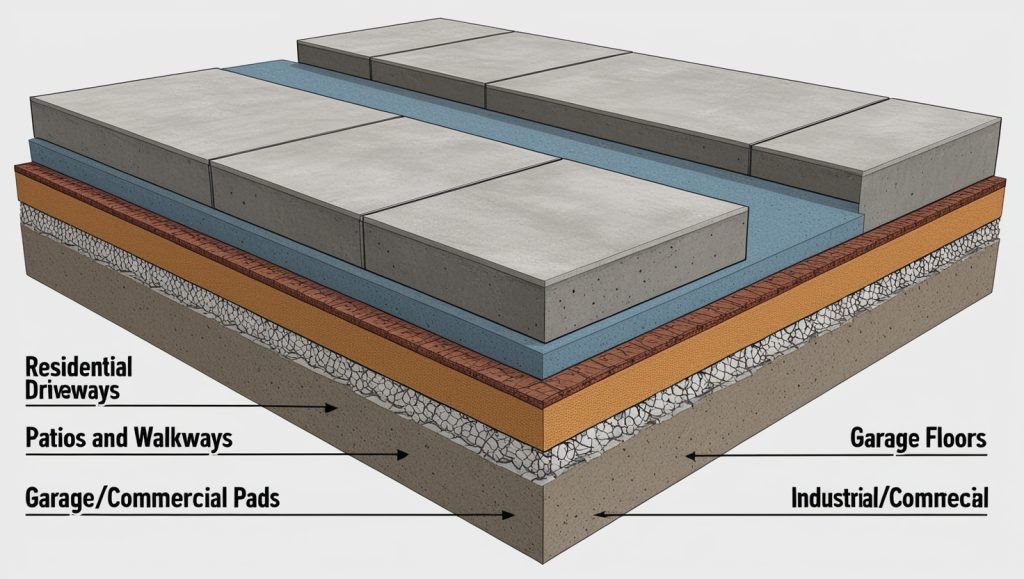
How Thick Should Concrete Pads Be?
Now that you know why thickness matters, let’s talk about how thick the concrete should be for different things. Here are some basic guidelines:
- Driveways: For a driveway, concrete should be 4 to 6 inches thick. This makes sure it can hold the weight of cars and trucks without cracking.
- Patios and Walkways: Patios and walkways need less thickness, usually about 3 to 4 inches. This is thick enough to hold up foot traffic and outdoor furniture.
- Garage Floors: Since garages hold cars, the concrete should be 4 to 6 inches thick, just like driveways.
- Industrial Pads: For factories or places with heavy machines, concrete should be 6 to 8 inches thick. This is strong enough to hold big, heavy equipment.
How to Decide on the Right Thickness
Choosing the right thickness is important, and you need to think about a few things before you decide. Then are some way to help you:
- Think about the weight: First, think about what the concrete will hold. Is it for people, cars, or big machines? The heavier the load, the thicker the concrete needs to be.
- Check the soil: Look at the soil where you’re going to pour the concrete. If it’s soft, you may need thicker concrete or even put down a layer of gravel to make the ground stronger.
- Think about the weather: Does it get really hot or really cold where you live? If so, you’ll need to make the concrete thicker to stop it from cracking.
- Get help from an expert: If you’re not sure, you can always ask a professional. People like engineers or concrete experts can tell you exactly how thick the concrete should be.
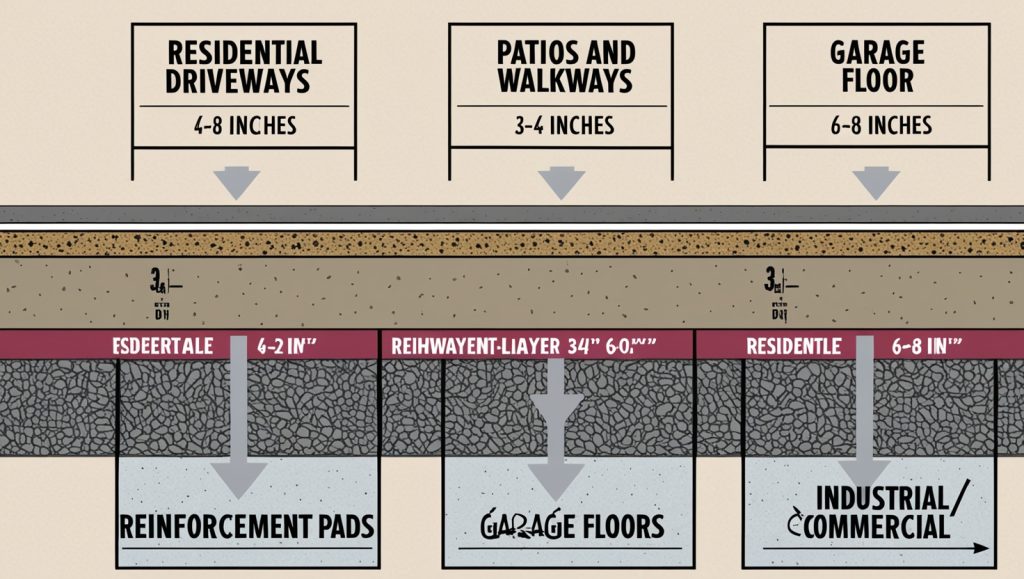
Tips for Pouring and Curing Concrete
When it’s time to pour the concrete, you want to make sure you do everything right. This will make the concrete strong and help it last longer. Here’s what you should do:
- Prepare the ground: Before pouring, make sure the ground is ready. You might need to add gravel or compact the soil so the concrete sits on a strong base.
- Use reinforcement: Adding steel bars, called rebar, or wire mesh to the concrete can help make it stronger. It stops the concrete from cracking over time.
- Pour evenly: When you pour the concrete, make sure it’s spread out evenly. This will help it dry smoothly and stay level.
- Let it cure: Curing means letting the concrete dry slowly. If it dries too fast, it might crack. Keep it wet for a few days and protect it from extreme temperatures.
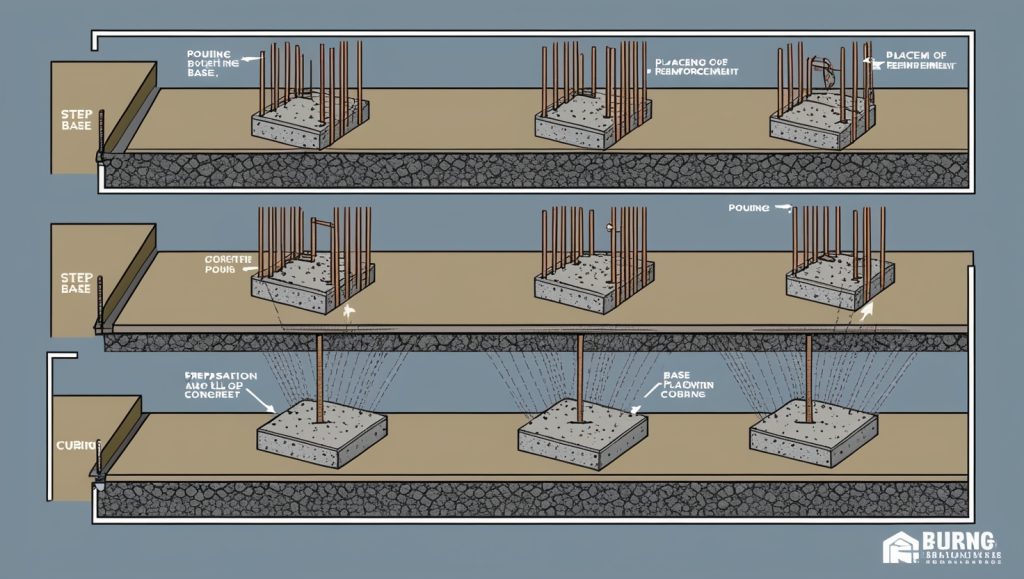
Concrete Pad Thickness: Conclusion
Making sure your concrete pad is thick enough is super important. If you don’t plan for the right thickness, the concrete might crack, break, or not hold up over time. Whether you’re building a patio, driveway, or a pad for heavy machines, you need to think about how thick the concrete should be. By following these tips and making sure the concrete is poured and cured the right way, you’ll have a strong and long-lasting concrete pad.
If you want to know more about Hanley Wood Business Media. Click here
FAQs
A driveway at home should be between 4 to 6 inches thick. This thickness is important because it helps the concrete stay strong under the weight of cars and trucks. If the concrete is too thin, it might break or crack when cars drive on it. By making the driveway thick enough, you make sure it lasts a long time without getting damaged.
The thickness of concrete is really important because it decides how strong the concrete will be. If the concrete is thick enough, it can hold heavy things like cars, furniture, or even buildings. But if the concrete is too thin, it might crack or break when something heavy is placed on it. So, by making the concrete the right thickness, we make sure it stays strong and lasts longer.
The soil beneath the concrete is really important for deciding how thick the concrete needs to be. If the soil is soft or not very strong, you need to make the concrete pad thicker so it doesn’t sink or crack. Sometimes, people put gravel or sand under the concrete to make the soil stronger. This helps the concrete stay smooth and level for a long time.
Yes, the weather can change how thick you need to make the concrete. In places where it gets really cold, concrete can crack if it’s too thin. This happens because the water in the ground freezes and thaws, which makes the concrete weak. To stop this from happening, you should make the concrete pad thicker so it can stay strong even in freezing weather.
A patio or walkway usually needs to be about 3 to 4 inches thick. This is enough to hold people walking on it and light things like tables and chairs. If you’re putting heavy things on the patio, like a barbecue grill or a large outdoor table, you might want to make it a little thicker so it doesn’t crack or break.
To figure out the right thickness for concrete, you need to think about what will be on top of it. If it’s just for people walking, 3 to 4 inches is enough. But if you’re going to park cars on it or put heavy equipment on it, you’ll need the concrete to be 4 to 6 inches thick or more. You also need to think about the soil and weather to make sure the concrete stays strong.
Yes, industrial pads, like those in factories or where big machines are used, need to be thicker than pads at home. Industrial pads usually need to be 6 to 8 inches thick or even more. This thickness helps the concrete support the weight of heavy machines without breaking. The thicker the concrete, the stronger it is to handle these big weights.
If the concrete pad is too thin, it can crack or break when something heavy is placed on it. For example, if a car drives over a driveway that’s too thin, the concrete might crack. This can make the surface uneven and not safe to use. When concrete cracks, it can also let water get inside, making the problem worse.
Yes, using materials like rebar or wire mesh inside the concrete makes it stronger. Rebar is a steel rod that helps the concrete stay in one piece. It keeps the concrete from cracking when heavy things are placed on it. Wire mesh does something similar by holding the concrete together so it lasts longer and stays stronger.
To make sure the concrete pad lasts a long time, you should follow some simple steps. First, make sure the pad is thick enough for what will be placed on it. Second, use reinforcement materials like rebar to keep it strong. Finally, after pouring the concrete, make sure it dries slowly and evenly, which is called curing. If you take these steps, your concrete pad will stay strong and last for many years.
